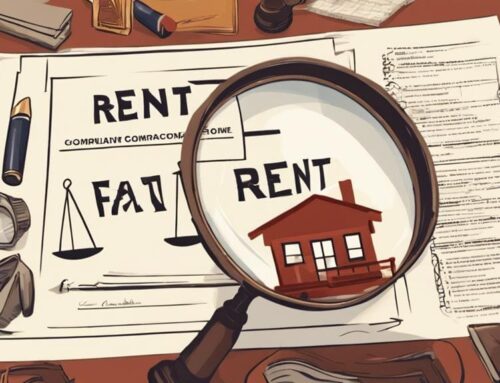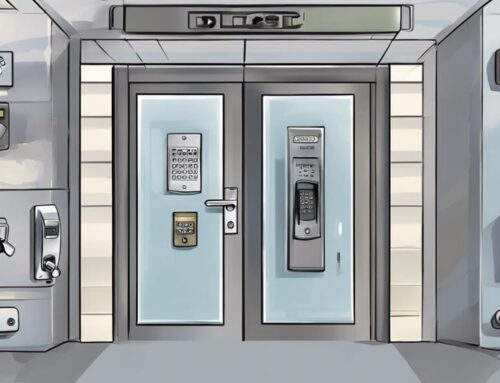As a commercial tenant in Texas, you have specific rights to guarantee your business operations run smoothly. If locked out unlawfully, you’re allowed to reenter the property. Security deposits must be returned within 30 days, provided you give a forwarding address and receive an itemized list of deductions. You also enjoy uninterrupted utility services, and landlords can’t disconnect them without valid reasons. Understanding lease terms, including duration, maintenance duties, and rent policies, is essential for preventing disputes. Legal remedies, such as lease termination or lawsuits for damages, are available if a landlord breaches the agreement. To explore these rights further, just continue.
Key Takeaways
- Commercial tenants in Texas can reenter their property if unlawfully locked out.
- Landlords must refund security deposits within 30 days and provide an itemized list of deductions.
- Rent can be withheld conditionally, and legal action can be pursued under Section 93.002.
- Tenants are protected from unauthorized utility service interruptions and can demand immediate reinstatement.
- Lease termination procedures must be followed, and tenants should provide written notice within the specified period.
Overview of Tenant Rights

Texas business tenants possess several important rights that protect them in their commercial lease agreements. One critical right you have is the ability to reenter your commercial property if you’re unlawfully locked out. This protection ensures that you can continue your business operations without undue interruptions.
Additionally, concerning your security deposit, providing your landlord with a forwarding address is crucial. This step is necessary to guarantee you receive any refund owed to you after your lease concludes.
In Texas, landlords must clearly specify the charges assessment details either in the commercial lease itself or in an attachment. This transparency helps you understand potential deductions from your security deposit and plan accordingly.
If you ever find yourself in a situation where you’re considering withholding rent, remember that this right is conditional and should be exercised carefully to avoid negative repercussions.
Should disputes arise, you have the right to pursue legal actions under Section 93.002. This statute provides a framework for addressing grievances and seeking resolution. By understanding and exercising these rights, you can safeguard your interests and maintain a positive relationship with your landlord.
Lease Agreement Terms

When reviewing your lease agreement for a Texas business property, it is important to confirm that it specifies the length of the lease, rent amount, and payment schedule in clear terms.
Additionally, it is crucial to clarify maintenance responsibilities to avoid future disputes. These elements are essential for managing your financial commitments and operational planning effectively.
Length of Lease
Understanding the length of your commercial lease is pivotal for effective planning and budgeting in the dynamic landscape of Texas business properties. The lease agreement should explicitly state the duration of the lease term to prevent any misunderstandings.
Typically, commercial leases in Texas range from 1 to 10 years. This range provides a spectrum of options to suit different business needs.
Longer lease terms often afford stability and potential cost savings. If you’re committed to a location and foresee consistent business growth, a longer lease can lock in rental rates and protect against inflation. Additionally, it can foster a sense of permanence and reliability, which is attractive to both customers and employees.
On the other hand, shorter lease terms offer flexibility. If your business is new or rapidly evolving, a shorter lease allows you to adapt to changing market conditions without being tied down. This flexibility can be critical in responding to unforeseen challenges or opportunities.
Regardless of the duration, make sure that the lease agreement clearly defines the start and end dates. This transparency is essential for aligning your business strategy with your tenancy, thereby fostering a sense of security and belonging in your commercial space.
Rent and Payments
Understanding the terms of rent and payments in your commercial lease agreement is important for maintaining financial stability and securing compliance with the landlord’s expectations. In Texas, commercial lease agreements often specify the terms of rent payments, including the amount, due dates, and any provisions for rent increases. It’s essential to thoroughly review your lease to grasp these terms and avoid unexpected costs.
| Aspect | Description | Significance |
|---|---|---|
| Rent Payment | Amount and due dates of rent | Secures timely payments and financial planning |
| Late Fees | Penalties for overdue payments | Prevents additional costs and maintains goodwill |
| Interest on Late Rent | Charges for late rent payments | Promotes timely payments |
| Rent Escalation Clauses | Conditions under which rent may increase | Prepares for future rent adjustments |
| Lease Review | Thorough examination of lease terms | Prevents misunderstandings and disputes |
Landlords have the right to impose late fees and charge interest on overdue rent payments, as specified in your lease. These late fees can quickly add up, making it important to ensure timely rent payments. Additionally, lease agreements may include rent escalation clauses that can lead to rent increases based on predetermined criteria. Understanding these terms helps you plan better and avoid financial strain. Always review your lease agreement meticulously to clarify any rent-related obligations and penalties.
Maintenance Duties
After timely rent payments, it’s equally important to grasp the maintenance duties specified in your lease agreement to avoid potential legal disputes and maintain a harmonious landlord-tenant relationship. Lease agreements typically outline responsibilities for the upkeep and repair of the leased premises. Understanding these provisions is vital for fulfilling your obligations and safeguarding your rights.
Generally, landlords are responsible for maintaining common areas, while tenants must manage their specific leased space. Your maintenance duties might include tasks like HVAC servicing, plumbing repairs, and structural maintenance, as explicitly outlined in the lease. Failing to adhere to these responsibilities can lead to disputes and potential legal consequences, making it essential to thoroughly review and understand the maintenance terms.
Carefully examine the lease provisions to clarify any unclear clauses related to maintenance duties. This understanding fosters a sense of belonging and ensures that both parties—landlord and tenant—are on the same page regarding the upkeep of the property. By fulfilling your maintenance obligations, you contribute to a well-maintained environment, which benefits all occupants and supports a positive landlord-tenant relationship.
Make sure to document any maintenance issues and communicate promptly with your landlord to address them effectively.
Utility Service Protections

As a tenant of a Texas business property, you’re protected from interruptions in utility services unless the landlord has a valid reason.
If your utilities are unlawfully disconnected, you have the right to request reinstatement and may be eligible for rent abatement during the interruption period.
Understanding these protections guarantees you can maintain uninterrupted business operations and address any service issues promptly.
Interruptions Without Valid Reasons
Texas landlords are prohibited from interrupting utility services for commercial tenants without valid reasons, as stipulated under Chapter 93 regulations. Valid reasons for such interruptions must be clearly outlined in your lease agreement or specified by law. As a commercial tenant in Texas, you have the right to expect uninterrupted utility services as long as you fulfill your lease obligations.
If your landlord attempts an interruption without valid reasons, this action is unlawful, and you may have grounds for legal action or other remedies. Given the significance of continuous utility services for your business operations, understanding this protection is vital. You should immediately seek legal advice if you face an unjustified interruption.
Knowing your rights fosters a sense of security and belonging within the business community. It’s crucial to review your lease agreement thoroughly and make sure it specifies the conditions under which utility services can be interrupted. By doing so, you can better protect your interests and maintain your business operations without unnecessary disruptions.
Right of Utility Reinstatement
Ensuring the reinstatement of utility services promptly is an essential right for commercial tenants when they face unlawful disconnections by their landlords. In Texas, tenant rights are robust in protecting against unauthorized utility interruptions. As a tenant, you’re entitled to continuous utility services unless your lease explicitly states otherwise. If your landlord unlawfully disrupts your utilities, it can severely impact your business operations. Understanding your rights is important to safeguarding your business.
You have the right to demand immediate utility reinstatement should a landlord disconnect services without valid reasons or proper notice. In such cases, you can seek legal remedies to enforce this right, ensuring your utilities are restored promptly to avoid further disruption.
This legal protection is a vital aspect of tenant rights, designed to maintain the stability of your business activities.
Rent Abatement for Interruptions
In addition to securing immediate utility reinstatement, you can negotiate rent abatement with your landlord if utility service interruptions disrupt your business operations. Understanding your rights in Texas is important for protecting your business during such interruptions. Here’s how you can effectively address this issue:
- Review Lease Agreements: Thoroughly review your lease agreements to understand your rights concerning rent abatement during utility interruptions. Verify clauses that protect you’re included.
- Negotiate Rent Abatement Clauses: Proactively negotiate rent abatement clauses when drafting or renewing your lease. This provides financial protection if utility services are interrupted beyond your control.
- Document Utility Interruptions: Keep detailed records of any utility interruptions, including dates, times, and the duration of each disruption. This documentation is essential when negotiating rent relief.
- Communicate with Your Landlord: Maintain open communication with your landlord about any utility interruptions and your need for rent abatement. Transparency can facilitate a smoother negotiation process.
Security Deposit Rules

Understanding security deposit rules is vital for both landlords and tenants in Texas business properties. As a tenant, you should know that Texas law mandates landlords to refund security deposits within 30 days of lease termination. To guarantee you receive your security deposit refund promptly, provide your landlord with a forwarding address in writing. This step is necessary; without it, the landlord isn’t obligated to return your deposit.
Landlords are required to accompany the security deposit refund with an itemized list of deductions, detailing any amounts withheld for damages beyond normal wear and tear. This transparency helps maintain trust and accountability. If you believe the deductions are unfair, having a precise list allows you to address any discrepancies effectively.
Failure on the landlord’s part to return the security deposit or provide an itemized list of deductions within the stipulated timeframe can lead to legal consequences. This legal framework exists to protect your rights and ensure fair treatment.
Handling Lease Termination

When handling lease termination for Texas business properties, first review your lease agreement to identify any specific clauses and procedures that apply. This initial step guarantees that you’re aware of your obligations and helps you avoid potential legal issues.
To navigate the process effectively, consider the following steps:
- Provide Written Notice: Most lease agreements require a written notice to the landlord within a specified period. Confirm your notice adheres to the timeline and format stipulated in your lease.
- Understand Potential Liability: If you’re terminating the lease early without proper justification, you might be responsible for the remaining lease balance. Review your lease to understand any financial repercussions.
- Negotiate a Shorter Lease Term: Initially, consider negotiating a shorter lease term to reduce complications with early termination. This strategy offers more flexibility and mitigates risk.
- Seek Legal Advice: If you’re uncertain about any aspect of the lease termination process, consult with a legal professional. They can help protect your rights and guide you through any complex legal issues.
Forcible Detainer Suits

After addressing lease termination, it’s crucial to understand how landlords in Texas can enforce their rights through forcible detainer suits when tenants violate lease terms. Landlords often resort to these legal procedures to regain possession of their property and claim unpaid rent.
Forcible detainer suits are initiated when tenants commit specific lease violations or engage in criminal activities. As a landlord, you must follow stringent legal procedures, including providing proper notice and meeting evidence standards to succeed in these suits. Understanding these steps is essential to ensure a fair and lawful process.
Here’s a concise breakdown of key elements involved in forcible detainer suits:
| Key Element | Description | Importance |
|---|---|---|
| Notice Requirement | Landlords must provide proper notice | Ensures legal compliance |
| Violation of Lease | Specific breaches or criminal acts | Grounds for suit initiation |
| Filing the Suit | Formal legal action in court | Begins the legal proceedings |
| Evidence Standards | Proof required to support the claim | Essential for case success |
| Court Hearing | Judicial review of the case | Final decision and enforcement |
Legal Remedies Available

Tenants in Texas can pursue various legal remedies, including termination of the lease, eviction proceedings, lawsuits for damages, specific performance, and mediation or arbitration, when landlords violate lease terms or fail to uphold their obligations. Understanding these options secures your rights are protected and provides a sense of belonging within the business community.
- Termination of Lease: If your landlord defaults on obligations or breaches the terms of your lease, you can end the agreement. This action frees you from further responsibilities under the lease, allowing you to seek a more reliable rental arrangement.
- Eviction Proceedings: As a tenant, you can initiate eviction proceedings if the landlord engages in illegal activities or gross lease violations. This process helps secure a safe and lawful business environment.
- Lawsuits for Damages: You can file a lawsuit to recover financial losses resulting from the landlord’s breach of lease terms. This remedy compensates you for damages, securing your business remains viable despite the landlord’s misconduct.
- Specific Performance: Specific performance compels the landlord to fulfill their lease obligations. This legal remedy secures the terms of the lease are upheld, providing stability for your business operations.
Seeking Legal Advice

Understanding the array of legal remedies available is only the first step; seeking legal advice guarantees you can effectively navigate these options and protect your rights as a business tenant in Texas.
Legal professionals provide invaluable guidance on your specific tenant rights and obligations within Texas business properties. By consulting an attorney, you gain clarity on the often complex language found in lease agreements, making sure you fully comprehend the legal implications of your commitments and entitlements.
When disputes arise with landlords, having legal aid can be essential. Lawyers are adept at interpreting lease agreements and can offer strategic advice on how to resolve conflicts while ensuring compliance with state laws. They can outline your responsibilities and potential legal recourse options, helping you make informed decisions that safeguard your interests.
Moreover, legal counsel makes sure that you’re aware of all your rights under commercial lease agreements, providing a sense of security and belonging within the business community.
Frequently Asked Questions
Can a Landlord Break a Commercial Lease in Texas?
Yes, a landlord can break a commercial lease in Texas, but only under specific conditions like tenant default or non-compliance with lease terms. They must adhere to the lease agreement and state laws. If they terminate without valid reasons or proper procedures, they could face legal consequences.
It’s essential you review your lease thoroughly to understand your rights and the landlord’s obligations regarding lease termination.
How to Evict a Business Tenant in Texas?
To evict a business tenant in Texas, you need to follow a specific legal process. Begin by providing the tenant with a proper notice as required by state law.
If the tenant doesn’t comply, file a forcible detainer suit. Guarantee you present sufficient evidence and adhere to all procedural requirements.
This meticulous approach guarantees that your rights as a landlord are upheld and the eviction proceeds smoothly within the legal framework.
Can a Landlord Lock You Out of Your Business in Texas?
In Texas, a landlord can’t just whimsically decide to lock you out of your business. They must follow strict legal procedures, ensuring they don’t trample on your rights.
If they do lock you out unlawfully, you have the right of reentry. This process is there to protect you, fostering a sense of security and belonging within the business community.
Always be informed and stand up for your rights.
What Landlords Cannot Do in Texas?
Landlords in Texas can’t interrupt your utility services without valid reasons, guaranteeing you’re protected from unjustified disruptions.
They must follow proper procedures for tenant abandonment and property disputes to safeguard your interests.
Additionally, landlords can’t unlawfully lock you out of your business; you have reentry rights.
Security deposit regulations require them to provide refunds within specified timelines, and you must provide a forwarding address to guarantee timely return.
Conclusion
Well, if you thought renting a business property in Texas was a walk in the park, think again. Between deciphering lease agreements that might as well be in hieroglyphics and maneuvering the murky waters of security deposits, you’ll need a law degree just to turn on the lights.
And heaven forbid you want to terminate a lease—better gear up for a legal showdown. So, keep that lawyer on speed dial and maybe invest in a stress ball.









